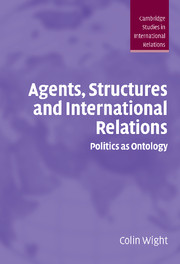Book contents
- Frontmatter
- Contents
- List of figures
- Acknowledgements
- Introduction
- 1 IR: a science without positivism?
- 2 The agent–structure problem: from social theory to IR theory
- 3 The agent–structure problem in IR theory: preliminary issues
- 4 Structure
- 5 Agency
- 6 The agent–structure problem: epistemology
- 7 The agent–structure problem: methodology
- 8 Conclusion
- References
- Index
- CAMBRIDGE STUDIES IN INTERNATIONAL RELATIONS
6 - The agent–structure problem: epistemology
Published online by Cambridge University Press: 22 September 2009
- Frontmatter
- Contents
- List of figures
- Acknowledgements
- Introduction
- 1 IR: a science without positivism?
- 2 The agent–structure problem: from social theory to IR theory
- 3 The agent–structure problem in IR theory: preliminary issues
- 4 Structure
- 5 Agency
- 6 The agent–structure problem: epistemology
- 7 The agent–structure problem: methodology
- 8 Conclusion
- References
- Index
- CAMBRIDGE STUDIES IN INTERNATIONAL RELATIONS
Summary
If the ontological aspects of the agent–structure problem are the most fundamental, epistemological and methodological issues have nonetheless emerged. The core epistemological issue, at least as contemporary debates frame the matter, concerns the extent to which the social world might be studied in a manner consistent with the methods of the natural sciences and the extent to which any epistemological distinctions which do arise mark out the study of the social world as both qualitatively and quantitatively different in kind from the study of the natural world. Wendt, Dessler and Carlsnaes argue that, although the ontological differences between objects in the social sciences and those in the natural sciences entail different methods and epistemic standards, these differences do not represent a set of fundamental distinctions such that the social and natural worlds are ‘worlds apart’. Hollis and Smith, Onuf and Kratochwil take a differing view, arguing that explanation and understanding are two fundamentally differing modes of social inquiry.
This issue can legitimately be described as the key debate surrounding contemporary theoretical developments within the discipline. The holy grail of this debate is the elusive via media, or a ‘bridge’ that could be built across differing research traditions. In general, those who argue against the possibility of such a via media frame their arguments in epistemological terms. Epistemological differences, we are led to believe, ‘militate against the emergence of a genuinely collaborative, truly integrated field’ of study. I consider this to be wrong.
- Type
- Chapter
- Information
- Agents, Structures and International RelationsPolitics as Ontology, pp. 226 - 254Publisher: Cambridge University PressPrint publication year: 2006

